Italy is a top spot in Europe for starting an online business. It’s easy to set up a business here, thanks to its relaxed rules. Both locals and foreigners can start a business without needing to be a citizen or live there.
Italy is also a big player in the global economy, ranking eighth. This makes it a great place for entrepreneurs to explore e-commerce. Starting an online business in Italy is becoming more popular, thanks to its growing e-commerce scene.
The cost to start a business in Italy can vary. It can be around €5,650 in the first year. After that, it’s about €1,850 each year. There are fees for registering your company and trademark, like a notary fee and trade register fee of about €520.
This guide is here to help you start your business in Italy. It will walk you through the steps. This way, you can be ready to face the challenges and seize the opportunities in this booming sector12.
Key Takeaways
- Italy is ideal for starting an online business due to its relaxed incorporation rules.
- The cost of establishing a business varies significantly, with first-year costs around €5,650.
- Italy holds the third-largest economy in Europe with numerous promising sectors.
- The incorporation process typically takes 5-6 days if documentation is in order.
- Understanding your target audience is crucial for success in the competitive Italy e-commerce landscape.
Why Consider Starting an Online Business in Italy?
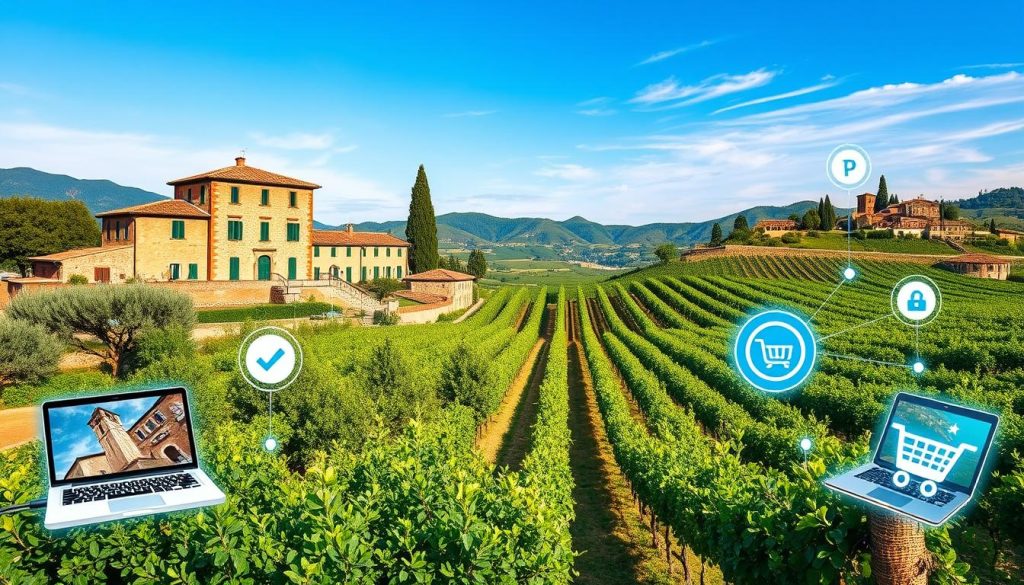
Italy is full of entrepreneurial opportunities that draw both local and international investors. Its spot in the European Union makes it great for trade, perfect for starting online businesses. The growing need for online shopping shows the benefits of starting an e-commerce in Italy.
Banks in Italy support new businesses with resources for financial help3. This makes it an attractive place to start a business.
Even though starting a business in Italy might cost more than in other places3, there’s a competitive market for products and services. Finding the right business incubators and partners is key to success. Italy also offers many marketing channels like online, print, and social media3.
Working with local communities can help a lot, as they often offer support and resources3. Platforms like Satchel make banking easier for businesses, with fast account setup and global transaction options4. They don’t need a deposit to start and can handle 38 currencies, showing the practical benefits for e-commerce entrepreneurs4.
The Growing E-commerce Market in Italy
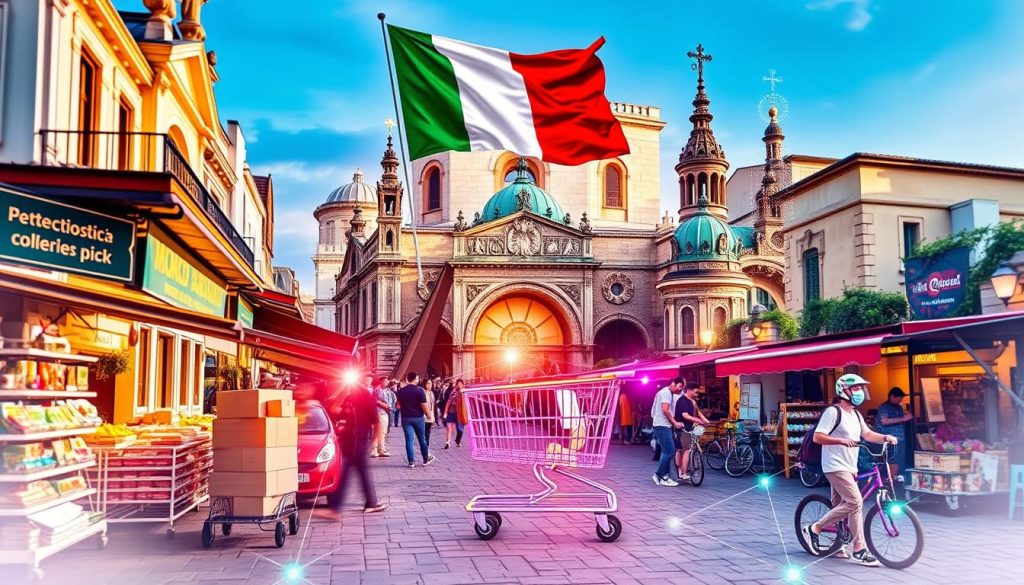
The Italian e-commerce market has seen impressive growth, reaching an estimated €76 billion in 20225. About 85% of the population, or 50 million people, use the internet regularly. This has boosted online shopping in Italy5.
Almost 40 million Italians shop online, showing a big part of the market5. More people are choosing to pay with credit cards and PayPal, as seen in e-commerce market statistics Italy6.
Cash is still a big part of shopping, making up 44% of transactions in recent years5. Mobile devices and cards are becoming more popular, making up about 40% of e-commerce sales5. Sites like Amazon.it and eBay.it are doing well, offering chances for businesses to reach Italian shoppers6.
New entrepreneurs need to know about e-commerce trends in Italy. Italian shoppers like websites that are fully in Italian, including product details and return policies6. Social media, with 44 million users, is key for marketing. Facebook and Instagram are important for reaching out to customers5. The rise of influencer marketing shows the need for businesses to keep their strategies fresh to grab Italian shoppers’ attention.
Can Anyone Open an E-commerce Business in Italy?

Almost anyone can start an e-commerce business in Italy. The process depends on your situation. EU residents find it easy to register their e-commerce business. But, a foreign entrepreneur in Italy might need to meet extra rules, like living in Italy or working with an Italian.
The rules for starting a business in Italy depend on where you live. You must follow both Italian and EU trade laws.
Italy’s market is growing, making it a great place for new businesses. With over 60 million people and a fast-growing e-commerce sector, there are lots of chances for success. Italy’s e-commerce market is one of the fastest-growing in Europe, after Spain.
It’s important to follow local laws, especially about VAT. Businesses selling to Italian customers must charge local VAT if they sell over €10,000 a year7. Knowing the rules for starting a business in Italy can help you succeed.
How to Start an Online Business in Italy

To start a business in Italy, you need to know the rules and visa options for foreign entrepreneurs. First, find out what you need to do to set up your business in the Italian market.
Understanding the Eligibility Criteria
Entrepreneurs wanting to start a business in Italy must check their business needs and gather the right documents. Foreigners often need a long-term residence permit or specific self-employment visas to work legally in Italy. The Italy Startup Visa is great for new, innovative businesses, needing a solid business plan and big investments.
The entrepreneur visa Italy asks for a minimum of €500,000 investment. So, it’s crucial to look at all your options carefully for your specific case8.
Types of Visas for Foreign Entrepreneurs
Italy offers different entrepreneur visas, depending on your business needs. The Italy Startup Visa is for new, innovative projects. The entrepreneur visa needs a lot of money invested. Knowing these visa types helps you choose the right one for your business goals, making the application easier. In Italy, a self-employment visa lets foreign entrepreneurs start their businesses quickly9.
Choosing the Right Business Structure

Starting an online business in Italy means picking the right structure. This choice affects your money, risk, and how you run the business. You might look at sole proprietorship or Limited Liability Company (LLC). Knowing about these helps match your business with your goals and situation.
Sole Proprietorship vs. Limited Liability Company
Sole proprietorship is simple and cheap to start. It has few rules and easy taxes, making it flexible. But, you could lose your personal money if the business fails.
On the other hand, an LLC in Italy keeps your personal stuff safe from business debts. It’s more complicated to set up than a sole proprietorship. Yet, many think the extra safety is worth it. An LLC can also look more professional, which might help attract investors.
Choosing between these structures is big. You need to think about how much risk you can handle, what you want your business to be, and how much money you have. Picking the right structure in Italy is key for success in the online world.
The Steps to Register Your Business
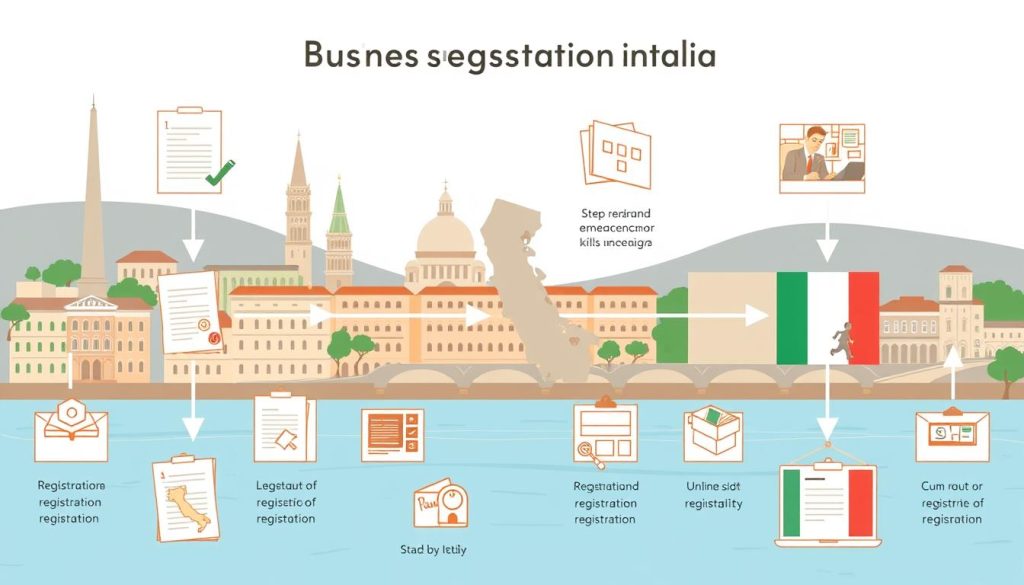
Registering a business in Italy is key to starting up legally. It involves several important steps and submitting crucial documents to the Italy Chamber of Commerce. Knowing these steps is crucial for a smooth startup.
Documentation Required for Registration
The registration process needs various documents, including:
- Articles of Association, outlining the company’s purpose and structure.
- Tax identification numbers, essential for all directors and legal representatives.
- Proof of address for the business premises.
- A detailed business plan that meets investment requirements, particularly if applying for the Entrepreneur Visa.
Starting an ecommerce business in Italy needs an initial investment of at least €500,000. Registration costs are around €2,00010. You must appoint a legal representative and follow corporate law for the Articles of Association11. Not following these rules can lead to fines or problems during registration11.
It’s vital for entrepreneurs to meet all legal duties. This includes registering with the Italian Commercial Registry (Registro delle Imprese) and getting the right licenses and permits. This is especially important if you plan to hire staff12.
Obtaining a Tax Identification Number
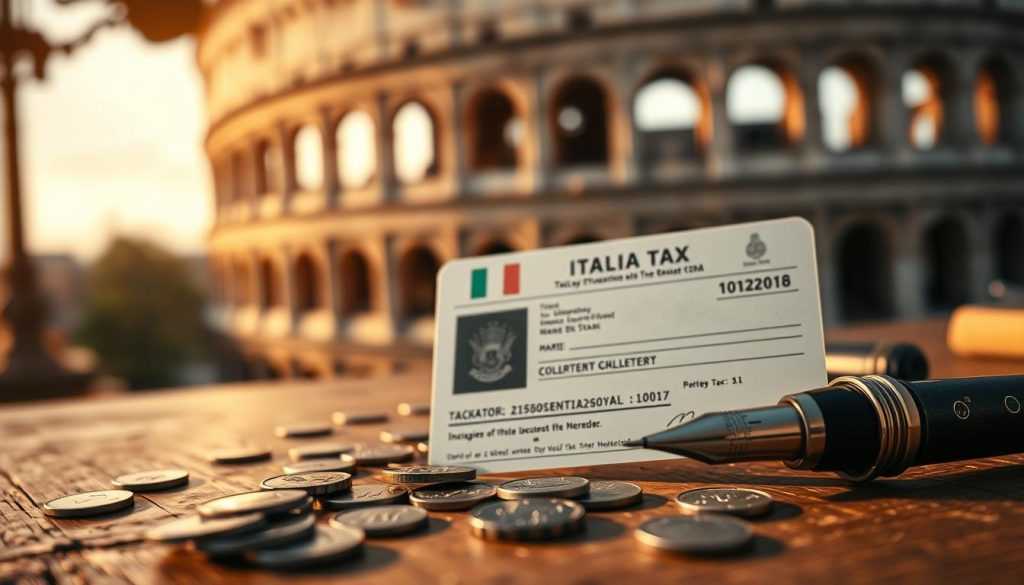
In Italy, getting a tax identification number, or Codice Fiscale, is crucial for businesses. Italian citizens get theirs at birth. But, foreigners need to ask the Italian government for one13.
This unique 16-character code is based on your personal details. It includes your surname, name(s), birth date, gender, and where you’re from14.
Non-EU citizens must apply for a tax ID at the Single Desk for Immigration or Police Headquarters. They need to bring valid documents like a passport with a visa or a residence permit13. The Codice Fiscale is vital for many things. It’s needed for jobs, freelancing, taxes, healthcare, and buying property14.
Opening a Business Bank Account in Italy

After you’ve registered your business, opening a corporate bank account in Italy is the next step. It’s important to keep your personal and business finances separate. You’ll need to provide documents like proof of identity, address, Italian tax number, and details about your job or studies15.
Italy has many banks for expats and international students, like Intesa Sanpaolo, UniCredit, and ING Italia15. Some UK banks, such as Barclays and Santander, also offer good deals for expats15. For those needing non-resident accounts, Civibank is great for cross-border business owners15.
Setting up a business account in Italy is easy and similar to other countries16. Online banks like Fineco Bank and Revolut are good for expats, letting you manage money from anywhere16. The Kingdom Bank is another option for offshore banking, making it easy to manage your account online16.
Registering Your E-commerce Website
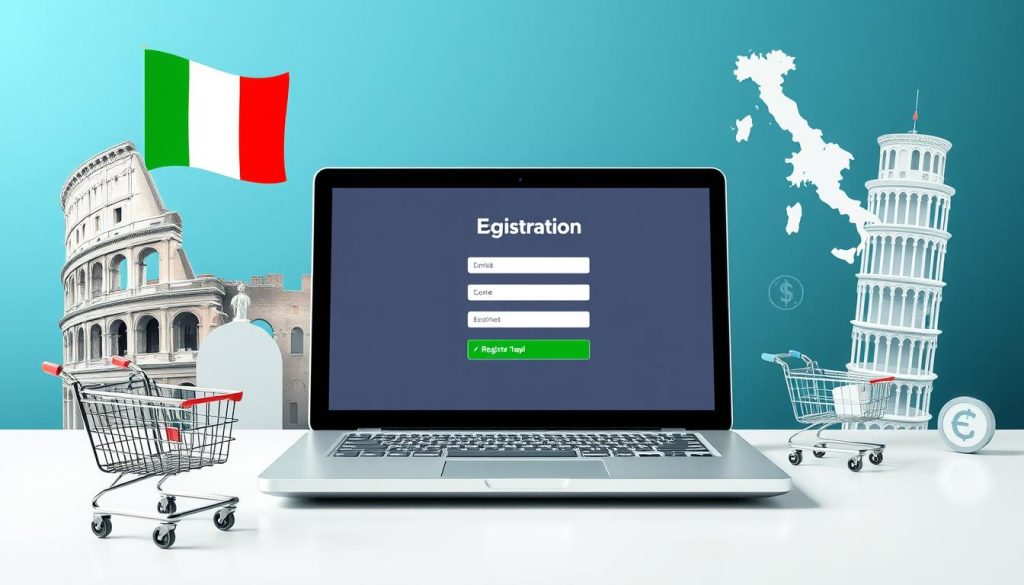
Registering your e-commerce website is a key step in starting an online business in Italy. First, you need to think about domain registration Italy. It’s important to get a .it domain to reach the Italian market. You can choose from platforms like Shopify, Wix, or Squarespace, each with its own features for different needs17.
Next, you must pick a reliable web hosting service. Your website should be easy to use on mobiles and have secure payment options. It’s also important to know the legal rules in Italy and the EU, which might include getting permits or following consumer protection laws18.
When you start the registration process, think about what products you want to sell. Choosing profitable products and making your site easy to find are key. It’s also important to be different from other online shops to succeed17.
Complying with E-commerce Regulations in Italy
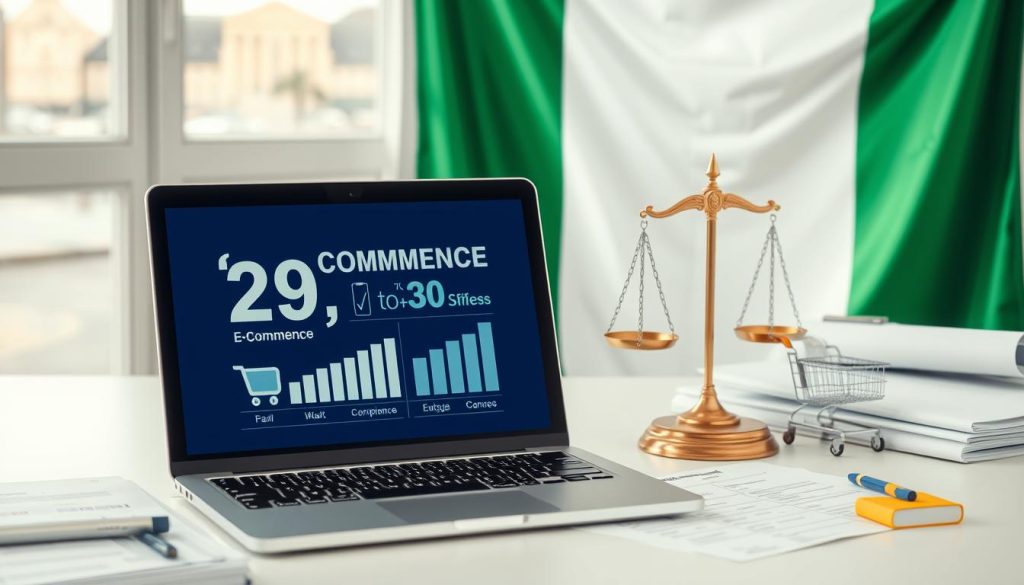
For businesses to thrive in Italy, following e-commerce rules is key. Online sellers must follow the Italian E-commerce Decree. This decree requires them to share important details before a sale is made. This includes information about what’s being sold and legal guarantees.
Companies also need to make it easy for customers to find out about their rights. This helps keep online businesses in line with the law.
Understanding Consumer Rights in Italy
Customers can cancel online deals within fourteen days without giving a reason. This rule builds trust and encourages safe online shopping. Businesses must also follow rules on misleading and comparative ads to protect customers.
They must give clear info on products, prices, and services during the buying process. This avoids any confusion. Keeping up with changing laws is crucial to avoid fines and follow the law fully1920.
Maintaining PCI Compliance
Keeping PCI compliance in Italy is vital for protecting credit card data. Working with trusted payment providers helps achieve this. It keeps data safe and builds customer trust.
Companies must meet all PCI standards as part of their online compliance plan. Following these rules is more important than ever as Italian laws get closer to EU standards1921.
Product Sourcing Strategies for E-commerce

Effective product sourcing is key for success in e-commerce. Entrepreneurs should look into various methods for finding products in Italy. They should focus on local suppliers and dropshipping services in Italy. Working with trusted manufacturers in Europe can lead to high-quality products and lower costs compared to Asia22.
Local suppliers offer flexibility and ensure they follow EU rules. This is crucial for a business to thrive.
Dropshipping is another smart strategy. It lets businesses sell products without keeping stock, saving on costs. By using dropshipping services in Italy, stores can offer more products with less financial risk.
It’s also important to know about consumer rights and the need for clear pricing. Italian law, like D.Lgs. 70/2003, requires clear product information in all communications23. Following the General Data Protection Regulation (GDPR) is also essential to avoid big fines that could harm a business’s reputation23. Accurate product descriptions help avoid legal problems and build trust with customers.
To create a good product sourcing strategy, consider quality, compliance, and cost. By choosing local suppliers and dropshipping, entrepreneurs can set up a successful online store in Italy.
Marketing Your Online Business in Italy

Marketing is key to an online business’s success in Italy. The digital world here is diverse, needing a mix of strategies to grab local shoppers’ attention. This includes using social media, teaming up with influencers, and SEO to boost visibility in a market growing by over 15% each year24. It’s vital to know the local culture and what customers like when marketing your business online.
Effective Digital Marketing Strategies
Creating strong e-commerce ads for the Italian market can really help your business. Here are some key areas to focus on:
- Search Engine Optimisation (SEO): Use SEO to make your products more visible on sites like Amazon Italy, which can increase sales24.
- Social Media Marketing: Use popular platforms in Italy, like Instagram and Facebook, for targeted campaigns to reach potential customers.
- Influencer Collaborations: Work with local influencers who match your target audience to gain trust and expand your reach.
- Email Marketing: Send out customised emails with special offers and updates, tailored to what customers want.
- Content Marketing: Share content that talks about local trends and interests, making your brand a leader in the market.
By using these strategies, businesses can tackle the digital marketing scene in Italy. They can build a strong online presence and keep up with changing consumer habits25.
Leveraging Dropshipping as a Business Model

Dropshipping in Italy is a popular choice for new entrepreneurs. It’s a cost-effective way to start an e-commerce business without a big upfront investment. This method saves money by not needing to hold any stock, which cuts down on initial costs26.
Many businesses use dropshipping alongside traditional methods. This makes it easier to adapt and change how they operate26.
Dropshipping works by making money from the difference between what you pay for goods and what you sell them for26. It’s also great for using platforms like Mercari and Poshmark to find customers. This way, you can start making money without spending on ads27.
Starting a dropshipping business can be quick and profitable. TikTok Shop is a new chance for fast growth and steady income27.
To start a dropshipping business, you need to do some important steps. First, find good niches and suppliers. Then, create a solid business plan and choose the right business structure26.
You also have to think about legal stuff. This includes following consumer protection laws and getting the right licenses26. Spending some of your profits on ads can help your business grow even more27.
Financial Considerations for Your Online Business

Starting an online business in Italy needs a good understanding of e-commerce finances. Knowing the costs, like incorporation fees and VAT, is key. At first, you might spend around €5,650 in the first year. But, costs usually go down in later years, helping your business grow better.
Understanding Business Costs and Registration Fees
In Italy, business costs include a 22% VAT on most goods and services. But, some items like food, drinks, and e-books have lower VAT rates. This can help cut down on expenses for certain businesses28.
Input VAT on business purchases can often be recovered. But, there are limits on things like vehicles and entertainment28.
It’s important to know about registration fees in Italy for budgeting. These fees cover the initial costs and ongoing compliance. For online businesses, following VAT rules means filing annual returns by 30 April. From 1 July 2022, there are new rules for reporting cross-border transactions in .XML format28.
Understanding these financial aspects well can help build a strong base for your online business.
Networking and Support for Entrepreneurs in Italy
Building a strong network is key for success in Italy. It lets founders get valuable insights and resources. Many groups, like government and private ones, help start-ups across Italy. Joining local business groups helps make connections and understand the Italian market better.
The Italia Startup Visa programme shows the support available. It helps tech-focused start-ups in Italy. Start-ups need to be based in Italy, have at least €50,000 in investment, and make less than €5 million in income29. A study found a 3.3% rise in innovative start-ups in Italy, showing a thriving ecosystem for entrepreneurs30.
Financing is also well-supported, with programmes like Smart & Start Italy and firms like LVenture Group and Innogest Capital backing start-ups. Start-ups have many resources, especially at the beginning, setting a solid base for growth.
Source Links
- https://wise.com/us/blog/starting-a-business-in-italy-as-a-foreigner
- https://startcompanyformations.co.uk/blog/how-to-start-a-small-business-in-italy/
- https://fastercapital.com/content/Starting-a-business-in-Italy.html
- https://www.hedgethink.com/the-steps-to-apply-for-a-business-account-online-in-italy/
- https://www.trade.gov/country-commercial-guides/italy-ecommerce
- https://zielinskijerzy.com/en/blog/online-store-italy/
- https://www.kvk.nl/en/international/e-commerce-in-italy/
- https://www.ecomzone.eu/post/step-by-step-guide-for-dropshipping-in-italy
- https://www.expatica.com/it/working/self-employment/freelancing-in-italy-80321/
- https://ugpayments.ch/blog/how-to-start-ecommerce-business-in-italy/
- https://parakar.eu/use-cases/starting-company-abroad/italy
- https://www.openaeuropeancompany.com/blog/how-to-set-up-a-company-in-italy/
- https://housinganywhere.com/Italy/codice-fiscale-italy
- https://taxing.it/italian-fiscal-code-number-tax-code-tin/
- https://wise.com/gb/blog/opening-a-bank-account-in-italy
- https://blog.thekingdombank.com/how-to-do-international-online-offshore-banking-in-italy/
- https://www.forbes.com/advisor/business/how-to-start-an-online-store/
- https://www.ecwid.com/blog/how-to-make-an-online-shop.html
- https://iclg.com/practice-areas/digital-business-laws-and-regulations/italy
- https://federcamere.it/rules-for-e-commerce-in-italy
- https://www.openaeuropeancompany.com/blog/legal-and-regulatory-requirements-for-italian-companies/
- https://wonnda.com/magazine/product-sourcing-in-europe/
- https://oslaw.eu/en/navigating-italian-ecommerce-law-a-comprehensive-guide-for-aspiring-online-entrepreneurs/
- https://www.smartscout.com/amazon-selling-guides/how-to-sell-on-the-amazon-italy-marketplace
- https://www.robinwaite.com/blog/how-business-coaching-can-transform-your-startup-in-italy
- https://www.wolterskluwer.com/en/expert-insights/how-to-start-a-dropshipping-business
- https://www.linkedin.com/pulse/starting-dropshipping-business-from-scratch-bryan-guerra-igipe
- https://taxsummaries.pwc.com/italy/corporate/other-taxes
- https://www.movingto.io/it/italy-startup-visa
- https://stripe.com/resources/more/italian-founders-fund
















